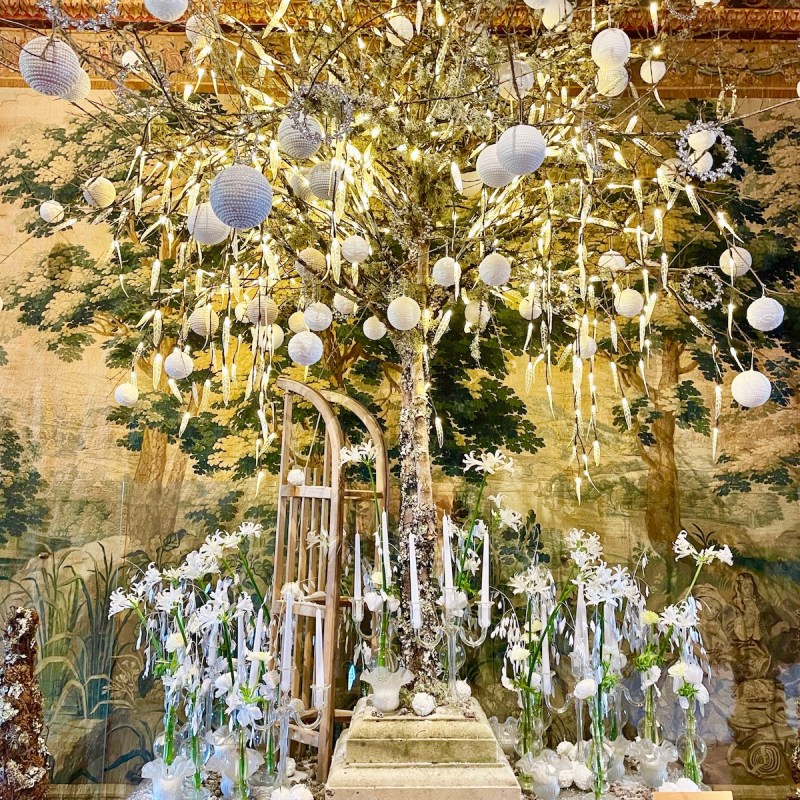
Some of the most spectacular Christmas displays, shows, and activities in France are just 2 hours by train from central Paris. The magnificent and regal Château of the Loire, once the medieval capital of France, where kings, queens, and royalty lived, are transformed into holiday delights during the month of December.
Videos by TravelAwaits

Château De Chenonceau
One of the most extravagant holiday displays is at the Château de Chenonceau. Dating back to the 12th century, the current château was constructed in the early 1500s and owned by King Francois I. In 1535, he left it to his daughter Diane of Poitiers. In 1559, Queen Catherine de Medici, who was the widow of French King Henri II, overthrew the palace and replaced Diane of Poitiers.
For the holiday season, the award-winning floral and tabletop designer, Jean Francois Boucher, sources the nearby forest for his inspiration, decorating long banquet tables and centerpieces with dried mushrooms, moss, and foliage. Boucher is known for winning the Meilleur Ouvrier de France, one of the highest honors in the country for craftsmen, awarded by the president. In the downstairs kitchen, Boucher caters to chocoholics and sets an all-chocolate table, also including Panettone, a classic Christmas staple. Each room of the château has the most sumptuous table settings with glazed, dried, and fresh fruits. Displays feature fresh and dried flowers, feathers, gold and silver painted branches, hanging displays with satin ribbons and colored ornaments, and gold candelabras on the tables. In the vestibules and the larger rooms, trees practically touching the ceilings are festooned with lights, ornaments, and festive decorations.
Château de Chenonceau organizes workshops, classes, tours, and wine tastings during the month of December. You can learn how to set a royal table with “The Art of Entertaining in the Renaissance” workshop, taught by an expert on historic table design. Boucher, the master himself, even teaches a class on how to create your own special floral arrangements for Christmas.
Château Clos Lucé
Originally owned by the royal Amboise family, Château Clos Lucé was given to a kitchen servant, Etienne le Loup, by King Louis XI as an inheritance. It later became the summer residence for the kings of France. In 1516, King Francis I and Louise de Savoie invited the Italian artist Leonardo da Vinci to become the premier painter, engineer, and architect for the king. Da Vinci was housed in the Clos Lucé, where he spent the next 3 years until he died in 1519.
In December, Château Clos Lucé celebrates the spirit of the master creator — and Christmas — with performances, workshops, and food events.
For the first time in its history, Château Clos Lucé is producing an interactive, mini-musical comedy, especially for children, where they are invited and encouraged to sing along, create art, or join in performing improv.
You can explore the 15-acre park grounds of the château in a horse-drawn carriage, where you will learn the fascinating history and visit the various buildings where da Vinci created his masterpieces and inventions. A soothing hot chocolate or mulled, hot wine with spices is an added treat at the end.
Once again, children are invited to Clos Lucé for Christmas to participate in classes where they can develop their artistry. There are opportunities for painting on glass and with watercolors, learning medieval calligraphy, drawing, making holiday cards, and designing Christmas tree ornaments.
Unique Culinary Experiences
Sieur Sausin, a chef specializing in historical cuisine, does a workshop about the cuisine of the Renaissance era. Participants learn how to cook the dishes of the period, the spices, the manners and customs, and table settings. Hot milk with cinnamon and mulled wine is served at the end.
Mathurine was the French cook for Leonardo da Vinci, living close to him during his final years. An official guide and historian embodies Mathurine, sharing his stories and private anecdotes about da Vinci and French Christmas legends and traditions from past centuries.

Château De Chambord
The largest of the Loire Château, Château de Chambord is a prime example of the mix of French medieval and French Renaissance architecture. Started in 1519 and completed in 1547, it was built for King Francois I and was also a hunting lodge with hunting grounds and extensive gardens. The massive, wooded park and game farm surrounding the château covers 13,000 acres, or 52.5 square miles.
Château de Chambord goes all out for Christmas with magnificent decorations, dozens of trees inside and out, and special light shows.
Almost 100 outdoor trees leading up to the château are lit up and the outside of the château is illuminated in dramatic, frequently-changing colors.
Traditional board games from the 1600s to the 1800s are available to play for adults and children. There’s lots of holiday entertainment with performers strolling throughout the château in period costumes, fencing demonstrations, musical concerts, and a Christmas Renaissance-style show featuring comedians, actors, a female singer, and four musicians.

Château De Blois
The Château de Blois, built between the 14th and 17th centuries, was the home of various Counts of Blois and French kings for almost 400 years. It contains 564 rooms, including 100 bedrooms and 75 staircases.
There are plenty of family activities for Christmas at Château de Blois, including a retelling of Beauty and the Beast, which is closely linked to the château; a cabinet of curiosities workshop for children; a workshop for making historical, paper silhouettes; and a mystery evening tour, where you can discover rooms not usually open to the public.
The Anooki is a 10-minute, magical light and sound illumination show displayed on the outside of the château.
Hotels
Le Choiseul
Le Choiseul, in the city of Amboise, is a charming, four-star hotel in a former 18th-century home just a 15-minute walk to Château Clos Lucé. The 36 Restaurant serves classic French specialties in an elegant dining room. Château de Chenonceau is about a 20-minute car ride from the hotel.
Fleur De Loire
Fleur de Loire is a newly-opened, five-star hotel and spa in the town of Blois. The hotel has a two-Michelin star restaurant, Christophe Hay, headed by celebrated chef Christophe Hay. It offers three-, six-, and nine-course dinners exclusively using locally sourced and produced ingredients. There’s also a more casual restaurant, bakery, and pastry shop, where everything is baked freshly on the premises. Château de Blois is about a 20-minute walk from the hotel and Château de Chambord is about a 25-minute drive.
Pro Tip: Amboise is about a 2-hour train ride from Paris’s Montparnasse station and Blois is about a 2-hour train ride from the Gare Austerlitz in Paris. We strongly recommend renting a car to travel in between the various châteaux because there’s little public transportation.
For more French-centric articles like this one:
